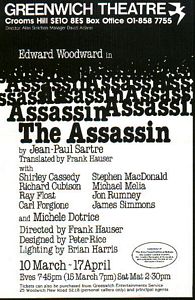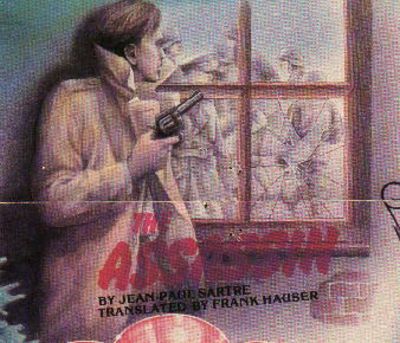THE ASSASSIN by Jean-Paul Sartre
Translated by Frank Hauser
Venue: Greenwich 1982
Directed by Frank Hauser

| Of Sartre's major
works for the theatre, 'The Assassin' (originally titled
'Crime Passionnel'
in translation) remains his masterpiece. Set in 1943
in the imaginary European state of Illyria,
contending against both German and Soviet troops,
the play centres round a young communist's
involvement in the Party's assassination plot
against the life of a leading statesman and develops
into a challenging political thriller. |
Cast
Hoederer - Edward Woodward
Hugo - Stephen MacDonald
Shirley Cassidy
Richard Cubison
Michael Melia
Ray Float
Jon Rumney
Carl Forgione
James Simmons
Michele Dotrice

Review
Jean-Paul Sartre’s Les Mains Sales, previously seen in London in another translation as Crimes Passionel, has surfaced again at Greenwich with its message intact and even topical now that the never-ending political battle between stern dogma and realities of power has broken out much closer to home. Frank Hauser has translated and directs the play under the title The Assassin but one is doubtful whether this closely-reasoned, highly philosophical piece is quite the thing for modern audiences brought up on a ten-minute free-for-all on Newsnight, for its three-hour discursiveness trundles along in a worthy fashion, each point being answered by a counter-point within the framework of a taut plot about a young, middle-class revolutionary being despatched to kill his party leader, suspected of collaborating with political opponents. The scene is a Central European country, say Hungary, in 1943, with the occupying Germans in retreat and the Russians gradually approaching the borders. The point, of course, is whether the Russians should be welcomed simply because they are of the same political persuasion as the underground, or whether the smaller country’s needs would be better served by a uniting of the three nationalist parties of widely-differing politics.
Hoederer, played in a cosy, man-to-man Harold Wilson fashion by Edward Woodward, puts country and people first and is prepared to wait and introduce socialism by consent. His opponents, represented by the immature Hugo (James Simmonds), his head full of theory and the certainty that he knows best, decide that Hoederer should be eliminated. Hugo, planted in Hoederer’s house in the position of secretary, unfortunately takes along his equally immature wife, depicted by Shirley Cassedy as a badly out-of-context English Home Counties girl, and it is only the fact that she is physically drawn to the leader that gives Hugo the incentive to carry out his task. The very real importance of what The Assassin has to say is to a certain extent swamped by the personal drama, but the play does sustain interest and Michele Dotrice is good as the girl Hugo should have married, though it is made clear that even her politics might be suspect when feelings get in the way.